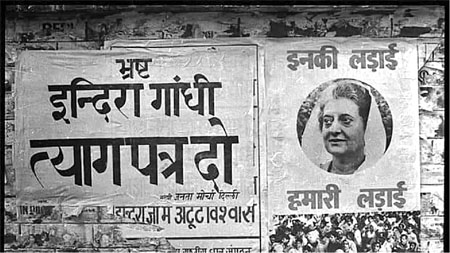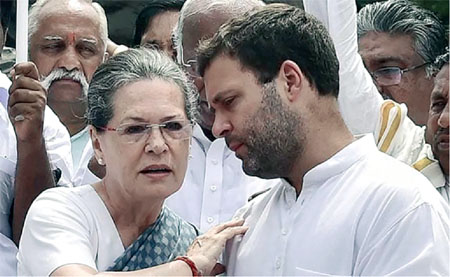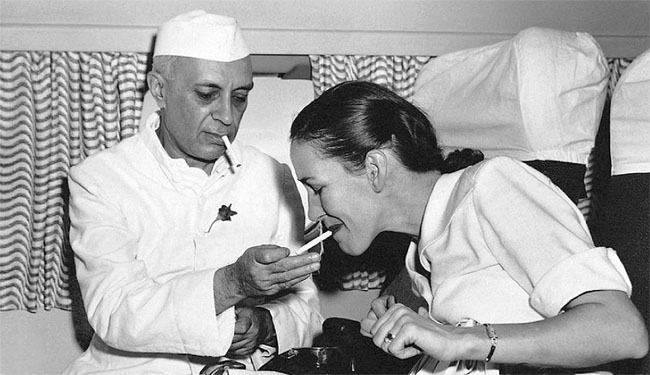From threatening the press during Nehru’s rule and co-opting it during Indira Gandhi’s time to intimidating and bullying in the present Sonia Gandhi’s era—Congress, has come one full circle
A timeline of how this right has been undermined since the inception of Indian independence. the Nehru-era
7 decades ago, the first amendment to the Constitution of India was brought in by the then Jawaharlal Nehru government. This amendment in 1951, which as per clause 2 of article 19, imposed “reasonable restrictions” on free speech on grounds like—in the interests of the sovereignty and integrity of India, the security of the state, friendly relations with foreign states, public order, decency or morality, contempt of court or in relation to incitement of an offence.
Erstwhile Prime Minister Nehru had justified curbing press freedom through his draconian Press (Objectionable Matter) Act, 1951. This lack of freedom of expression was also visible when poet and lyricist Majrooh Sultanpuri was arrested and spent a year in jail for writing a poem critical Nehru.
Incidentally, one of the immediate triggers for restricting freedom of expression by Nehru was primarily the battle between him and Organiser.
In February 1950, the weekly published several reports critical of the Nehru government. These reports criticised the then Prime Minister’s policies and brought to the fore the plight of thousands of Hindu refugees, who were forced to migrate from East Pakistan to West Bengal after they were targeted in widespread communal violence.
An infuriated Nehru decided to clamp down on the Organiser. It was a ‘pre-censorship order’ and was issued under the notorious East Punjab Public Safety Act.
The matter was taken to the Supreme Court. In this famous case, which is known in Constitutional history as Brij Bhushan vs The State of Delhi, it was argued that the pre-censorship order was an infringement on the freedom of speech. It was also argued that the law under which this order has been issued doesn’t fall under any provisions in the Constitution of India. So the government’s pre-censorship order is illegal.
During Indira Gandhi era
The then prime minister Indira Gandhi suspended the civil liberties—free press among other things—and the Constitution was amended and altered. During the emergency in 1975, journalists, Opposition leaders, and activists were thrown in jail under the Draconian rule of Indira Gandhi government.

Most of the mainstream media newspapers and magazines were under the wrath of Emergency. The scissors of censors cut through big publishers like Himmat, Janata, Frontier, Sadhana, Swarajya among many others. Some were threatened to be thrown out of publications and others were put in jail. The Indian Express and the Stateman were first ones to protest through their editions.
In 1982, under a Congress government, Bihar Press Bill of 1982 was introduced by the then Chief Minister Jagannath Mishra. The bill had given the state government the authority to restrict publishing of ‘grossly indecent’, ‘scurrilous matter’ or one that was ‘intended for blackmail’. Journalists violating the bill could land in jail for two years for the first offence.
The government used intimidatory measures such as eviction from government houses and shutting down media houses, against journalists and publishers. The Indira Gandhi-led government also implemented the Monopoly and Restrictive Trade Practices (MRTP) Act that limited the reach of media to the audience due to lesser prints. Such regulations against freedom of expression by the Congress have also been seen in this millennium. In 2012 the UPA government blocked access to Charlie Hebdo’s cartoons and also blocked access to an anti-Islam film. One of them was a veteran BJP, the then Janata Party leader LK Advani, who spent months in jail during the Emergency. He addressed the media and said: “You were asked only to bend, but you crawled.”
During Rajiv Gandhi’s era
During his regime, he tried to censor the press by passing the infamous Defamation Bill in the Lok Sabha, but he was forced to withdraw the bill before it became law after it faced intense opposition from the public.

He attempted to pass a Postal bill, which sought powers to censor and intercept all mail. The law would have allowed him to set up an entire department with huge offices in all cities to look at every letter sent in the mail. The letters would be censored and ordinary people arrested for the crime of sending letters criticising the government. Fortunately, President Zail Singh precipitated a constitutional crisis by refusing to sign the bill. The Rajiv Gandhi government banned Salman Rushdie’s Satanic Verses,—the first country to do so—an act that would attract the attention of the whole world in terms of curtailing free speech.
Sonia-Rahul Gandhi era
Section 66A, introduced as part of an amendment to the IT Act in 2008, is draconian in the Nehruvian tradition circa 1951. Section 66A elaborates on the subject of offensive messages and punishments thereon through communication service, etc.

In 2012, Aseem Trivedi, a political cartoonist was arrested on sedition charges after his drawings that criticised rampant corruption among Indian politicians, they were displayed at a protest in New Delhi by anti-corruption crusader Anna Hazare. His arrest was seen as growing intolerance for criticism.














Comments